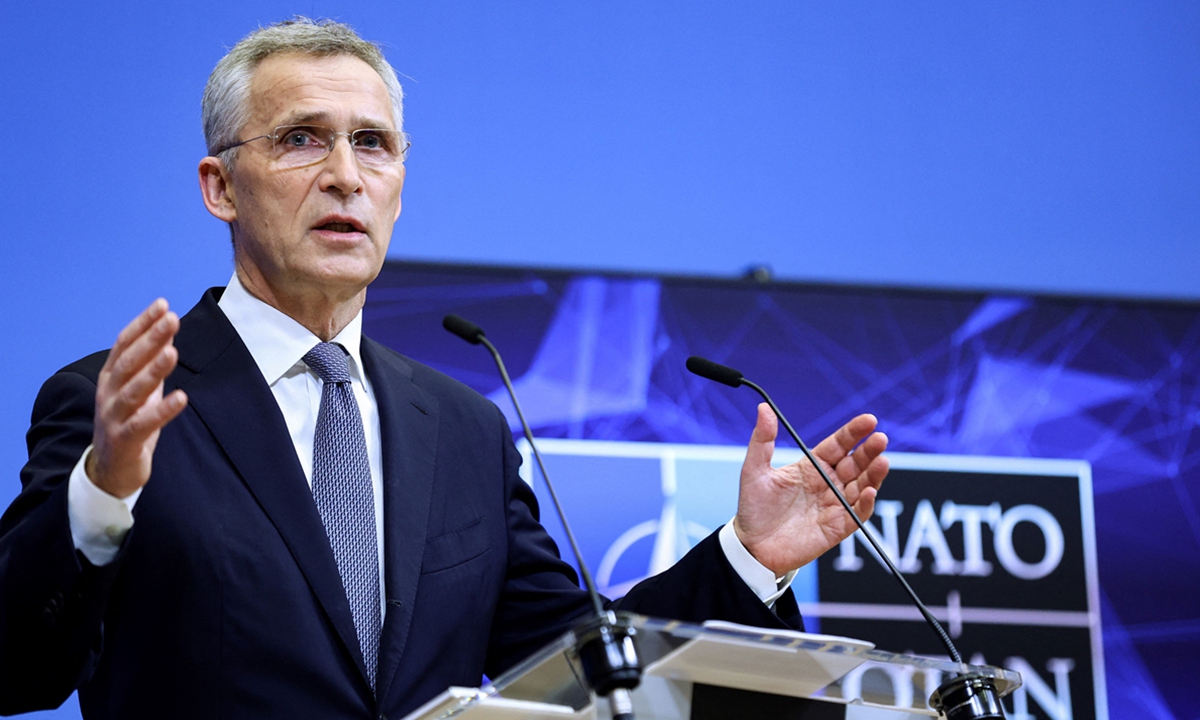
NATO Secretary General Jens Stoltenberg. Photo: AFP
Jens Stoltenberg, the current NATO secretary general, is to stay on for another year. This comes as the transatlantic military alliance has failed to find an apt one that satisfies all. His term has already been extended three times, and this will be his fourth term. Against the backdrop of the ongoing Russia-Ukraine conflict, the block of other candidates and the selection of Stoltenberg shows the unconcealable divergences within NATO and the US' tight control over it.
The potential candidates included Danish Prime Minister Mette Frederiksen and British Defense Minister Ben Wallace. Frederiksen seemed to meet the requirements of some European allies as a possible first female leader and by being from the EU. But NATO nations on the alliance's eastern flank wanted someone from their region to take the reins in a bid to underscore a tougher stance against Russia. As for Wallace, a number of NATO allies wanted a former head of state or government in charge, and France insisted on someone from an EU country. Obviously, the UK is not an EU country anymore. The key is Wallace did not obtain US backing. A defense source told Sky News: "Biden just didn't want to support the UK." European Commission President Ursula von der Leyen was reportedly US President Joe Biden's preferred candidate to lead NATO. However, concerns may arise over her recent poor handling of the German defense ministry. And Olaf Scholz, the German chancellor and a former political rival of von der Leyen, would like to see her out of the frame to keep a top EU job.
As an article in the Daily Mail said, "The process for appointing NATO chiefs is all behind closed doors, and highly political among the 31 member states."
The wrangling surrounding the position of the new secretary general highlights that NATO is not united as one. Song Zhongping, a Chinese military expert and TV commentator, told the Global Times the most serious disagreement within NATO is whether NATO member states should pay for their own national security or the interests of the US' global hegemony.
NATO is a military alliance, but the role of the NATO Secretary-General is a more political one. There is no formal process for selecting the secretary general. The members of NATO traditionally reach a consensus on who should serve next. Shen Yi, a professor at the School of International Relations and Public Affairs of Fudan University, told the Global Times that the secretary general needs to maintain neutrality between the US and Europe in form, but, in fact, it is effectively controlled by the US, that is, it cannot contradict Washington's decision under any circumstances. The US is more of a master than the leader of NATO. No one can become the head of NATO unless the US accepts.
"In the eyes of the US, Stoltenberg is a qualified agent. This is the reason why Stoltenberg became the final choice as well as the most worry-free choice by the US," said Song. Stoltenberg firmly implements the policy stance held by the US in the Russia-Ukraine conflict. He has made every effort to coordinate the 31 NATO member states and even coordinate countries outside of NATO, such as Japan, South Korea and Australia, to provide military and financial assistance to Ukraine.
Not only on the Russia-Ukraine issue, Stoltenberg's stance on China has also pleased Washington. At last year's NATO summit held in Spain, China was identified for the first time as a "systemic challenge to Euro-Atlantic security" in NATO's strategic concept. This coincides with the US definition of China as "the greatest danger to American security." This April, Stoltenberg criticized China for its handling of matters related to Taiwan island, Hong Kong, the South China Sea, mass surveillance, and the internet. He also accused China of investing in long-range nuclear missiles and participating in joint patrols alongside Russian forces.
Shen believes that another reason why the US finally picked Stoltenberg is that the US election season is approaching, and the US has invested too much in the Ukrainian battlefield for more than a year, which has undoubtedly diverted the resources the US originally intended to use for its competition with China. In this case, the US urgently needs a controllable NATO.
Song said that every country should prioritize its own national security, but the US is using security as an excuse to deceive other countries, play them for a sucker, and make them pay for the US' global hegemony. This is why some NATO countries, like Hungary, France and Turkey, are unwilling to be subject to the US, which has led to a lack of consensus within NATO on major issues, including the selection of the secretary general and major policy matters involving China and Russia.




